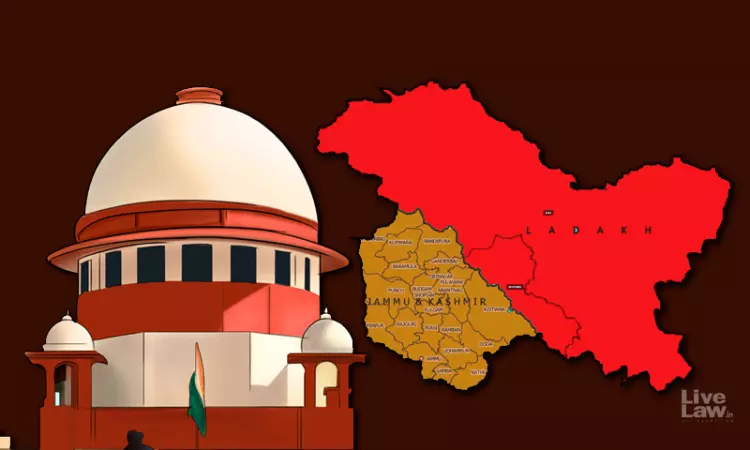Description

Copyright infringement not intended
Picture Courtesy: www.livelaw.in
Context: The Proclamation of 1949 by Yuvraj Karan Singh was a significant document that played a role in the Supreme Court's judgment upholding the abrogation of Article 370.
Key Highlights
- In post-judgment statements, the court emphasized that the proclamation of 1949 was issued for the country's and the state's benefit. It was seen as a necessary step to remove any ambiguity and to align Jammu and Kashmir's constitutional framework with that of the newly-formed Republic of India.
- The Supreme Court, in its judgment, referred to the Proclamation of 1949 as a significant legal document. It argued that with the issuance of the proclamation, paragraph 8 of the Instrument of Accession ceased to have legal consequences, implying that the state had effectively surrendered its sovereignty.
Repeal of the Government of India Act 1935
- The proclamation explicitly stated that the Government of India Act 1935, which governed the constitutional relationship between Jammu and Kashmir and the Dominion of India, would be repealed. This indicated a clear break from the existing constitutional arrangement.
Adoption of the Indian Constitution
- Karan Singh declared that the Constitution of India, then in the process of being adopted by the Constituent Assembly of India, would govern the relationship between Jammu and Kashmir and the Union of India.
- He affirmed that the provisions of the Indian Constitution would be enforced in Jammu and Kashmir by him, his heirs, and his successors.

Superseding and Abrogation of Inconsistent Constitutional Provisions
- The proclamation explicitly stated that the provisions of the Indian Constitution would supersede and abrogate all other constitutional provisions inconsistent with it that were in force in the state at that time.
Full and Final Surrender of Sovereignty
- The critical phrase used in the proclamation was the "full and final surrender of sovereignty." This indicated an unambiguous commitment by the leadership of Jammu and Kashmir, represented by Yuvraj Karan Singh, to surrender the state's sovereignty to India.
Ambiguity Resolution
- Karan Singh, in later statements, explained that the proclamation was issued to eliminate any ambiguity regarding Jammu and Kashmir's status. There was uncertainty about whether the state had become an integral part of India after Hari Singh, Karan Singh's father, signed the Instrument of Accession.
Acceptance of the Indian Constitution's Supremacy
- The Proclamation reflected a clear acceptance of the supremacy of the Indian Constitution. By stating that the Constitution of India would govern the relationship, it acknowledged the legal framework and principles outlined in the Indian Constitution.

Conclusion
- Karan Singh's Proclamation of 1949 served as a foundational document that clarified and affirmed the integration of Jammu and Kashmir with the Union of India. The Supreme Court, in upholding the abrogation of Article 370, relied on this proclamation as evidence of the state's full and final surrender of sovereignty to India under the Indian Constitution.
Must Read Articles:
Status of Jammu and Kashmir: https://www.iasgyan.in/daily-current-affairs/status-of-jammu-and-kashmir#:~:text=The%20state%20of%20Jammu%20and,property%20in%20Jammu%20and%20Kashmir.
Jammu and Kashmir Special Status: https://www.iasgyan.in/daily-current-affairs/jammu-and-kashmir-special-status
|
PRACTICE QUESTION
Q. What role did The Proclamation of 1949 play in relation to Article 370?
A) It strengthened Article 370
B) It had no impact on Article 370
C) It opposed the abrogation of Article 370
D) It supported the abrogation of Article 370
Answer: D
Explanation:
The Proclamation of 1949, issued by Yuvraj Karan Singh, played a supportive role in the abrogation of Article 370, aligning Jammu and Kashmir with the rest of India.
|















